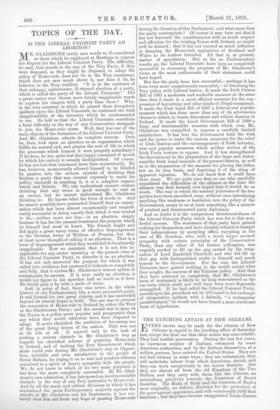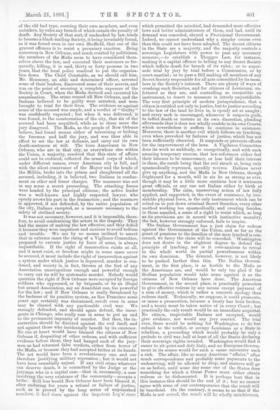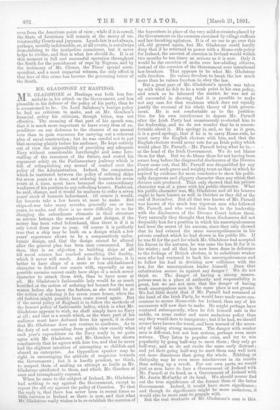THE LYNCHING AFFAIR AT NEW ORLEANS.
EVERY excuse may be made for the citizens of New Orleans in regard to the lynching affair of Saturday last, except the final one that their action was unavoidable. They had terrible provocation. During the last few years, an enormous number of Italians, estimated by some American authorities, and by the Italians themselves, at ak million persons, have entered the United States. They are not bad citizens in some ways ; they are industrious, they will undertake labour from which Americans shrink, and they can work energetically in the hotter districts. But they are almost all from the old Kingdom of the Two Sicilies, and they carry with them, like the Chinese, an astonishing proclivity towards the formation of Secret Societies. The Mafia of Sicily and the Omura of Naples were originally, we believe, Societies for the protection of the poor against oppression, and. stall occasionally fulfil that function ; but they have become exaggerated Trade-Unions of the old bad type, coercing their own members, and even outsiders, by rules any breach of which entails the penalty of death. Any Society of that sort, if unchecked by law, tends to become a black-mailing Society, it being invariably found, as it was found even in our own Sheffield, that one of the gravest offences is to resist a pecuniary exaction. Being numerous in New Orleans, and much courted by politicians, the members of the Mafia seem to have considered them- selves above the law, and executed their sentences so fre- quently, killing, it is said, thirty or forty persons in two years, that the local police resolved to put the organisa- tion down. The Chief Constable, as we should call him, Mr. Hennessy, an able and determined officer, arrested some of their leaders, discovered some of their secrets, and was on the point of securing a complete exposure of the Society in Court, when the Mafia decreed and executed his assassination. The crime roused all New Orleans, and the Italians believed to be guilty were arrested, and were brought to trial for their lives. The evidence as against some of the accused was ample, and a verdict of " Guilty " was confidently expected ; but when it was delivered, it was found, to the consternation of the city, that six of the accused had been acquitted, while as to three more the jury disagreed. The Mafia, as the people of New Orleans believe, had found means either of terrorising or bribing the foreman and half the jury, and was thus able in effect to set the law at defiance, and carry out its own death-sentences at will. The born Americans in New Orleans, who are in that city, as everywhere else within the Union, a majority, resolved that this state of affairs could not he endured, collected the armed corps of which, under different names, every American city is full, and with the silent connivance of the Mayor and the heads of the Militia, broke into the prison and slaughtered all the accused, including, it is believed, two Italians in confine- ment on other and lesser charges. The massacre was not in any sense a secret proceeding. The attacking forces were headed by the principal citizens ; the active leader was a well-known and highly respected lawyer, who openly avows his part in the transaction ; and the massacre is approved, if not defended, by the entire population of the city, Italians excepted, as a measure necessary to the safety of civilised society.
It was not necessary, however, and it is impossible, there- fore, to avoid condemning the actors in the tragedy. They had the means of making the law effective, and they defied it because they were impatient and_ anxious to avoid tedium and trouble. We are by no means inclined to assert that in extreme cases the rising of a Vigilance Committee, prepared to execute justice by force of arms, is always unjustifiable. If the right of insurrection exists at all, and it must exist, or freedom might in some cases never be secured, it must include the right of insurrection against a system under which justice is depraved, murder is con- doned, and society is, in fact, thrown at the feet of any Association unscrupulous enough and powerful enough to carry out its will by systematic murder. Nobody would question the right if New Orleans were occupied by foreign soldiers who oppressed, or by brigands, or by an illegal but armed Association, say an Anarchist one, too powerful for the law ; and if New Orleans is really threatened by the badness of its punitive system, as San Francisco some years ago certainly was threatened, revolt even in arms may be classed with any pardonable civil war. We strongly defended, and should again defend, the insur- gents in Chicago, who really rose in arms to put an end to the permanent impunity of murder. But then, the in- surrection should be directed against the evil itself, and not against those who incidentally benefit by its existence. No one at heart would have blamed the citizens of New Orleans if, despairing of other redress, and with sufficient evidence before them, they had hanged such of the jury- men as had returned false verdicts, either from terror of the Mafia, or because they had accepted bribes at its hands. The act would have been. a revolutionary one, and one therefore justifying military repression ; but it would not have been essentially unjust. If any civil crime whatever can deserve death, it is committed by the Judge or the juryman who in a capital case—that is, necessarily, a case involving the very existence of the community—accepts a bribe. Still less would New Orleans have been blamed if, after enduring for years a refusal or failure of justice, such as is proved by the long series of unpunished murders, it had risen against the impotent Leg's! iture which permitted the mischief, had demanded more effective laws and better administrators of them, and had, until its demand was conceded, obeyed a Provisional Government. Indeed, we cannot understand why a simpler course even than this could not have been adopted. The decent citizens in the State are a majority, and the majority controls a sovereign Legislature with power to pass any necessary measure,—to establish a Thuggee Law, for instance, making it a capital offence to belong to any Secret Society which inflicts death for breach of its rules ; or to super- sede trial by jury by trial before a Commission, or by court-martial; or to pass a Bill making all members of any Secret Society responsible for all acts committed by its mem- bers in the Society's interest. There are plenty of ways of crushing such Societies, and for citizens of Louisiana, un- fettered as they are, and controlling so irresistible an instrument, to resort to massacre is utterly unjustifiable. The very first principle of modern jurisprudence, that a citizen is entitled not only to justice, but to justice according to the law of the land he lives in, is openly set at naught ; and every mob is encouraged, whenever it suspects guilt, to inflict death or torture at its own discretion, pleading afterwards that it does not wholly confide in its own Courts, which nevertheless it suffers to continue in existence. Moreover, there is another evil which follows on lynching, even when provoked by failures of justice, which has not been sufficiently observed. It suspends or prevents efforts for the improvement of the laws. A Vigilance Committee does its work so suddenly, so energetically, and with such amazing temporary success, that law-reformers either feel their labours to be unnecessary, or lose half their interest in them, the result being that the evil struck at, being only spasmodically repressed, speedily revives. Italians never give up anything, and the Mafia in New Orleans, though frightened for a month, will in six be as strong as ever, though it may be a little more cautious how it sentences great officials, or any one not Italian either by birth or membership. The calm, unswerving action of law fully applied, and supported, in the event of resistance, by irre- sistible physical force, is the only instrument which can be relied on to put down criminal Secret Societies, every other method working too spasmodically, and creating besides, in those assailed, a sense of a right to resist which, so long as its provisions are in accord with instinctive morality, the law, however strongly enforced, fails to inspire. The Italian Government has a just claim for redress against the Government of the Union, and so far as the grant of pensions to the families of the men lynched is con- cerned, we fancy the claim will be conceded. Washington does not desire in the slightest degree to defend the principle of lynching, nor is it over-anxious to reveal to the whole world its partial powerlessness within its own dominion. The demand, however, is not likely to be pushed farther than this. The Italian Govern- ment, in the first place, is as hostile to the Mafia as the Americans are, and would be only too glad if the Sicilian population would take arms against it as the citizens of New Orleans have done. The American Government, in the second place, is practically powerless to give effective redress by any means except payment of a sum of money, which is rather a concrete apology than redress itself. Technically, we suppose, it could prosecute, or cause a prosecution, because a treaty has been broken, and a treaty must be taken notice of in every Court ; but practically the only result would be an immediate acquittal. No citizen, respectable Italians not excepted, would give evidence, nor would any jury convict. The trial over, there would be nothing for Washington to do but submit to the verdict, or occupy Louisiana as a State in rebellion, a proceeding which would probably be only a prelude to civil war, half at least of all the States declaring their sovereign rights invaded. Washington would find it easier to sit quiet and defy Italy, and no European Govern- ment in its senses would for such a cause encounter such a risk. The affair, like so many American "affairs," after much correspondence and probably some payments to the undeserving, will be allowed to drop, and matters will go on as before, until some day some one of the States does something for which a Great Power must either obtain redress or be dishonoured. It is perhaps best that in this instance this should be the end of it ; but we cannot agree with some of our contemporaries that the result will be beneficial. On the contrary, it seems to us that if the Mafia is not cowed, the result will be wholly mischievous, even from the American point of view ; while if it is cowed, the State of Louisiana will remain at the mercy of un- trustworthy Courts and jurymen. Lynch-law is not always, perhaps, morally indefensible, or, at all events, is not always demoralising to the instinctive conscience, but it never helps to civilise, and that is what law should do. It is at this moment in full and successful operation throughout the South for the punishment of rape by Negroes, and by the testimony of Mr. Clowes, the Times' special corre- spondent, and. a most impartial witness, the only effect is that fear of this crime has become the governing terror of the South.




































 Previous page
Previous page